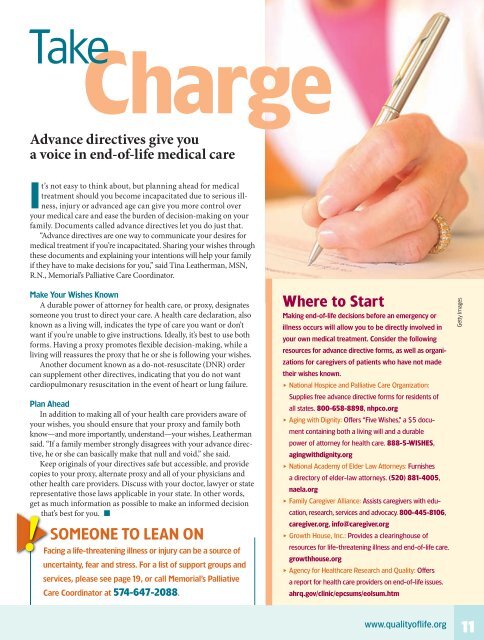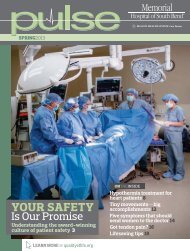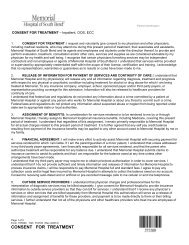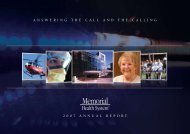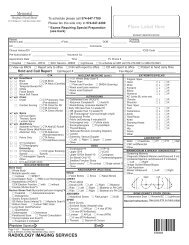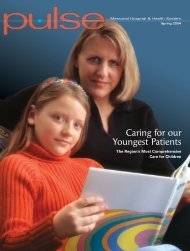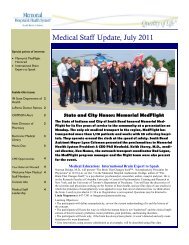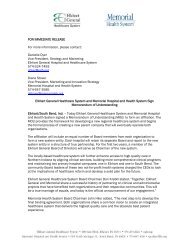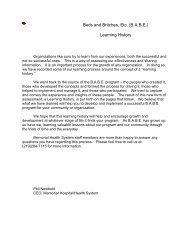Fall 2005 - Memorial Hospital of South Bend
Fall 2005 - Memorial Hospital of South Bend
Fall 2005 - Memorial Hospital of South Bend
Create successful ePaper yourself
Turn your PDF publications into a flip-book with our unique Google optimized e-Paper software.
Take<br />
Charge<br />
Advance directives give you<br />
a voice in end-<strong>of</strong>-life medical care<br />
It’s not easy to think about, but planning ahead for medical<br />
treatment should you become incapacitated due to serious illness,<br />
injury or advanced age can give you more control over<br />
your medical care and ease the burden <strong>of</strong> decision-making on your<br />
family. Documents called advance directives let you do just that.<br />
“Advance directives are one way to communicate your desires for<br />
medical treatment if you’re incapacitated. Sharing your wishes through<br />
these documents and explaining your intentions will help your family<br />
if they have to make decisions for you,” said Tina Leatherman, MSN,<br />
R.N., <strong>Memorial</strong>’s Palliative Care Coordinator.<br />
!<br />
Make Your Wishes Known<br />
A durable power <strong>of</strong> attorney for health care, or proxy, designates<br />
someone you trust to direct your care. A health care declaration, also<br />
known as a living will, indicates the type <strong>of</strong> care you want or don’t<br />
want if you’re unable to give instructions. Ideally, it’s best to use both<br />
forms. Having a proxy promotes flexible decision-making, while a<br />
living will reassures the proxy that he or she is following your wishes.<br />
Another document known as a do-not-resuscitate (DNR) order<br />
can supplement other directives, indicating that you do not want<br />
cardiopulmonary resuscitation in the event <strong>of</strong> heart or lung failure.<br />
Plan Ahead<br />
In addition to making all <strong>of</strong> your health care providers aware <strong>of</strong><br />
your wishes, you should ensure that your proxy and family both<br />
know—and more importantly, understand—your wishes, Leatherman<br />
said. “If a family member strongly disagrees with your advance directive,<br />
he or she can basically make that null and void,” she said.<br />
Keep originals <strong>of</strong> your directives safe but accessible, and provide<br />
copies to your proxy, alternate proxy and all <strong>of</strong> your physicians and<br />
other health care providers. Discuss with your doctor, lawyer or state<br />
representative those laws applicable in your state. In other words,<br />
get as much information as possible to make an informed decision<br />
that’s best for you. ■<br />
SOMEONE TO LEAN ON<br />
Facing a life-threatening illness or injury can be a source <strong>of</strong><br />
uncertainty, fear and stress. For a list <strong>of</strong> support groups and<br />
services, please see page 19, or call <strong>Memorial</strong>’s Palliative<br />
Care Coordinator at 574-647-2088.<br />
Where to Start<br />
Making end-<strong>of</strong>-life decisions before an emergency or<br />
illness occurs will allow you to be directly involved in<br />
your own medical treatment. Consider the following<br />
resources for advance directive forms, as well as organizations<br />
for caregivers <strong>of</strong> patients who have not made<br />
their wishes known.<br />
u National Hospice and Palliative Care Organization:<br />
Supplies free advance directive forms for residents <strong>of</strong><br />
all states. 800-658-8898, nhpco.org<br />
u Aging with Dignity: Offers “Five Wishes,” a $5 document<br />
containing both a living will and a durable<br />
power <strong>of</strong> attorney for health care. 888-5-WISHES,<br />
agingwithdignity.org<br />
u National Academy <strong>of</strong> Elder Law Attorneys: Furnishes<br />
a directory <strong>of</strong> elder-law attorneys. (520) 881-4005,<br />
naela.org<br />
u Family Caregiver Alliance: Assists caregivers with education,<br />
research, services and advocacy. 800-445-8106,<br />
caregiver.org, info@caregiver.org<br />
u Growth House, Inc.: Provides a clearinghouse <strong>of</strong><br />
resources for life-threatening illness and end-<strong>of</strong>-life care.<br />
growthhouse.org<br />
u Agency for Healthcare Research and Quality: Offers<br />
a report for health care providers on end-<strong>of</strong>-life issues.<br />
ahrq.gov/clinic/epcsums/eolsum.htm<br />
Getty Images<br />
www.anytownhospital.com www.quality<strong>of</strong>life.org<br />
11


